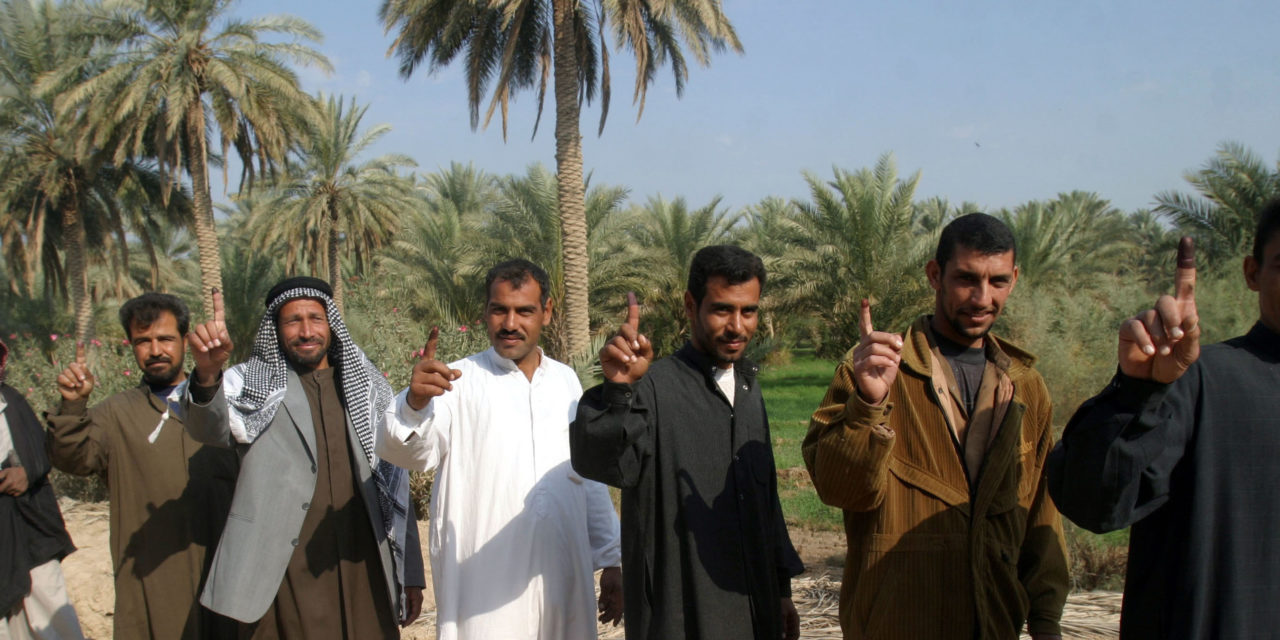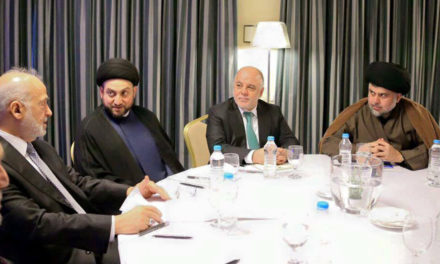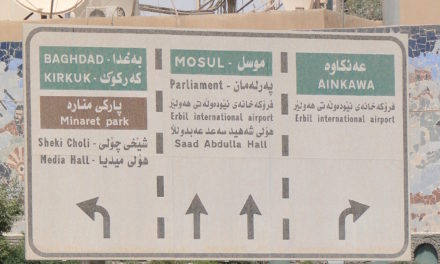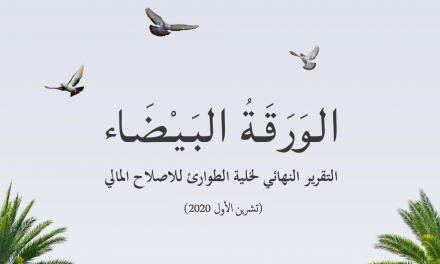As the election looms closer, various boycott campaigns circulate in Iraqi social media urging citizens to unsettle the electoral process so that the United Nations may step in as a third-party arbiter. This rhetoric is not only mired in unsubstantiated facts and wishful thinking, but if acted upon, will backfire. Studies of electoral politics in the United States and elsewhere have shown that low voter turnout tends to empower those very “same old faces” that Iraqis are (rightfully) complaining about. Moreover, history has shown that international intervention in elections is neither guaranteed to occur nor is it guaranteed to achieve results. Rather, international intervention (whether directly or indirectly) can have some severely negative consequences. In an era of democratic backslide, unsettling Iraq’s electoral process seems like a needlessly risky gamble which, if successful, will lead to instability at best and backslide into authoritarianism at worst. Although there are reasonable concerns about the minutiae of Iraq’s electoral system, they do not justify its dismantling nor inviting instability into the country once more. At the same time, the grievances of the boycotters are legitimate and their thinking is nationalistic. More importantly yet, the fact that they want to boycott the elections in order to bring in a third-party arbiter shows that they have not given up on democracy itself, but rather, are concerned with the quality and integrity of the electoral process.
The election boycott, at its core, is an expression of dissatisfaction with the institutions of accountability and competition in Iraq. Simply stated, people are fed up with the same clientelistic politicians that have been mired in self-serving sectarianism since 2003. They also have specific electoral grievances – most prominently their frustration with the Webster/Sainte-Laguë method for allocating seats (which, for a system designed to favor small parties, has been tampered with to suit large parties in Iraq). Unlike those Iraqis hankering for the authoritarianism of the past, the ideological boycotters believe in Iraqi democracy and want to reform it. The problem with their hopes for reform is that boycotting the elections simply will not achieve them. Their stated strategy is unsound, and even if it were to succeed, it would have dangerous consequences.
There are three features of democratic governance: competition, participation and accountability. The boycotters’ aim is to increase accountability by using their participation as a means of managing competition. While the threat of boycott has been shown to increase accountability, boycott itself challenges democracy by directly and indirectly weakening participation. Directly boycotting translates into low voter turnout, which in turn, translates into an advantage for entrenched parties and a disadvantage for new parties. Evidence from political science research has shown that entrenched parties with resources and networks have a pre-mobilized base and thus are not only unaffected by boycott, but are aided by it because it decreases their competition.
Indirectly, the popularization of boycotting will make abstaining more socially acceptable. If Iraq’s past elections tell us anything, it is that there is some social pressure to participate in elections. However, this social pressure has been decreasing in part due to the relative nonchalance the religious establishment has taken towards voting as well as on account of boycotting becoming a socially acceptable alternative. If a subset of Iraqis who are inclined to abstain for various non-ideological reasons (apathy, high costs to voting, etc…) come to believe that boycotting is a valid electoral choice with positive effects, we may witness an increase of non-ideological boycotters. And although there is an ideological difference between boycotting and abstaining, there is little difference in electoral outcomes post-hoc. In the end, it all amounts to low voter turnout, which once more amounts to support for the parties with pre-mobilized bases.
By boycotting the elections, we are making it harder for anyone but “the same old faces” to win. According to a body of scholarship from the UCLA School of Political Parties, party gate-keeping is a phenomenon in which party elites – more so than any other factor – select for similar features in their representatives. Therefore, the problem is with political parties who produce the same types of candidates repeatedly. In some countries – like Lebanon, Japan, and India – this has translated into various types of hereditary politics (which some Iraqi politicians have tried and failed to initiate). Thus, the problem of the same old faces is intrinsically tied to a larger problem of political parties in Iraq. Boycotting the elections empowers those parties to continue in their self-serving, non-productive gate-keeping. Instead, Iraqi voters should channel their energy towards ending the monopolization of Iraqi politics.
Moreover, Iraqi voters should not be disheartened by a popular narrative of Iraq that falsely frames it as the only country facing issues of clientelism and monopolization. The electoral process is complicated across the globe and citizens from Italy to Mexico, Spain and Lebanon and elsewhere share similar concerns. Most recently, Italians bemoaned that the new parties were hiding the same old faces. James Madison, one of the American founding fathers, recognized political parties (which he referred to as factions) as a double-edged sword: necessary for liberty but also deeply decisive in some ways. For Iraq, it is essential that we recognize the ways in which parties can be decisive and vote accordingly.
Even if all these concerns were non-issues and the boycott were to somehow challenge the electoral process, the outcome of that challenge would not be in Iraq’s interest. In the best case (and entirely unrealistic) scenario in which we get third party intervention, it is not likely to address any of the concerns of the boycotters. According to a review of the Political Science literature on international intervention in elections, Judith Kelley (2012), finds that intervention in elections – including the method proposed by the boycotters – can have serious unintended consequences. For example, it can legitimize fraudulent elections by increasing a blind trust in the system, reducing citizen-led accountability, and incentivizing politicians to find new ways to cheat that are then left undetected by the system. Not to mention that some of the concerns raised by boycotters (such as election fraud) are issues that have been addressed by the Iraqi electoral commission. Most importantly, Iraqis (of all people) should know by now that relying on an outside party to solve any of our problems is an unsound strategy.
All this aside, the most worrisome potential outcome of a boycott is that of democratic backslide in a region that is relapsing into authoritarianism. We are surrounded by cautionary tales – from Turkey to Egypt – and both history and research have shown that it is extremely difficult to recover from these relapses. Democratic backslide can be described as a deterioration of democratic institutions, including the electoral mechanism. Thus, a successful boycott of the elections (though unlikely) challenges a key democratic institution and creates a vacuum that will allow anyone in a position of power to consolidate power under the guise of short-term protection of Iraq. And, as we all know perfectly well, any Middle Eastern za’eeem who can declare a state of emergency has no intention of stepping down or consolidating democracy. Iraq does not lack from strongman characters (from all factions) that would love an opportunity to exercise their role as unconstrained life-long presidents. Delegitimizing the electoral process will either lead us down a road of conflict and instability or it will allow those with a reasonable monopoly on the means of violence to make a grab for power under the false pretense of protecting Iraq.
About a month ago, The Economist described Iraq as “a rarity- the only Arab state, other than Tunisia, to get rid of its dictator and remain a democracy.” This success should not be taken for granted. The Iraqi electorate is not powerless. If we were powerless, then politicians would not spend time and resources trying to convince us to vote for them (albeit, at times, in less than ideal ways). More importantly, the Iraqi electorate – including the boycotters – are not unpatriotic. They have a genuine interest in elevating Iraq’s democracy but they fail to recognize that their boycott has severe repercussions: firstly, it may weaken Iraqi society’s voting incentives by providing a socially legitimate alternative to voting (after all, “boycotting” sounds better than not voting). Worse yet, it is tied to low voter turnout which is only good for those very same “old faces” we want to avoid. More importantly, the boycott argument is built upon the unsupported hopes of outside intervention that have neither historical precedent nor documented success. Finally, it may lead to political instability or democratic backslide and both will be hard – if not impossible – to recover from.

Marsin Alshamary
Marsin Alshamary is a PhD candidate in comparative politics and international relations at MIT.










